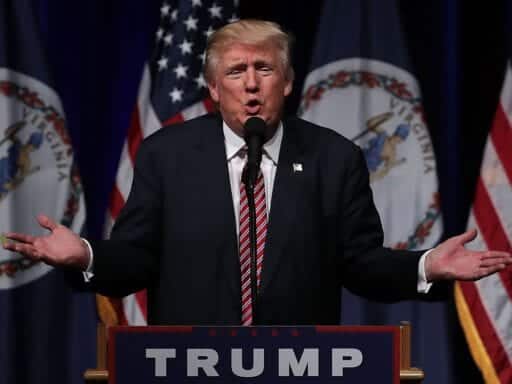World leaders have long linked germs and immigrants to stoke fear in moments of crisis.
Americans generally expect that when regularly scheduled programming is interrupted to cut to the president sitting in the Oval Office, they will hear an important, sober, and universal message — a message almost always of unity, often a call for shared responsibility and even sacrifice.
President Trump just used the powerful symbol of his office to attempt to divide us.
Seated behind his desk in the White House Wednesday, Trump looked into the camera and warned Americans of an enemy who has infiltrated our borders. We are at war, he said, with a “foreign virus.”
It’s a tactic meant to distract from what his administration has and hasn’t done, in this case to combat the coronavirus pandemic. “This is the most aggressive and comprehensive effort to confront a foreign virus in modern history,” Trump said of his administration’s work.
The pandemic, of course, isn’t a spy. It’s not an infiltrator. It’s a health crisis that’s been long predicted. The way we’ll fight it is through mechanisms like social distancing, a technique that requires clear, direct information so everyone knows it’s important to participate and how to do so. It’s a shared responsibility. We are in this together.
That is not the language of the Trump era. Trump rode into office on a message of division, of fear and hate and xenophobia. He announced his campaign in 2015 by smearing Mexicans. Even his inaugural address was laced with dark notes. “From this day forward,” he said during his address, “it’s going to be only America first.” Xenophobia isn’t a bug in the system for him; it’s a feature.
Throughout his time in office, again and again, he’s rallied his supporters through fear of outsiders — whether it was fear of travelers from Muslim-majority countries or asylum seekers at the US-Mexico border. He’s portrayed foreigners as filthy and derided others’ homelands as “shithole countries.”
Now, faced with explaining his government’s response to an outbreak that’s getting worse, he’s relying on the same tropes.
On Wednesday night, when he should have been calling on Americans to come together, he attempted to make us afraid of all of Europe. “To keep new cases from entering our shores, we will be suspending all travel from Europe to the United States for the next 30 days,” Trump said (excluding the UK for some reason).
This isn’t the first time in history a leader has stoked fears among the public by linking outsiders to germs, of course. It’s been part of many dark chapters in world history. Researchers have found repeated connections between germs and immigrants throughout the 20th century. In a moment of crisis, it’s particularly jarring and dangerous.
In this case, though perhaps predictable, it also happens to be dubious.
Experts pointed out that full-scale travel bans haven’t been effective. Italy, the hardest-hit country in Europe, was the first European country to ban travel to and from China, where the outbreak originated, and it didn’t help.
Trump plans travel restrictions to Europe @StateDept level 3 warning. How enforced? Quarantine returning citizens? @POTUS conflates closed border & #COVID19 response To be clear, germs don’t respect borders. Most of Europe has = or < cases than US. Travel bans won’t make US safer
— Lawrence Gostin (@LawrenceGostin) March 12, 2020
And Trump’s big announcement ignores the fact that the virus is already in the United States, spreading locally. The big threat isn’t the virus coming to the United States. It’s already here.
“A large number of new clusters in the United States were seeded by travelers from Europe,” Trump said — without explaining how the virus is spreading now or even highlighting some of the best science-based measures to test for it or stop it from spreading.
Medical experts reacted critically to Trump’s ban by pointing out that it ignores the work that really needs to be done, such as testing to assess the full scale of the crisis and mass communication with the public about how to prevent the spread.
The US President has banned all travel from Europe for 30 days, excluding UK.
This is a distraction:
– US has local transmission already
– we’re struggling to even conduct surveillance to know our burden
– ignores vital mitigation steps we know we need to do now#COVID19— Dr Alexandra Phelan (@alexandraphelan) March 12, 2020
Trump did tell Americans to cover their mouths and noses when they cough or sneeze. He did finally say it was best to stay home if you are sick.
But his message wasn’t the sober, direct statement Americans might expect from the president in the Oval Office. More worrisome, maybe a xenophobic speech designed to distract is what we we actually should have expected.
Author: Laura McGann
Read More



